Daily Vocabulary Words: List of Daily Used Words in Leading International Newspapers
Hi there. Welcome to this special section @ Wordpandit.
Our endeavour here is very simple: to highlight important daily vocabulary words, which you would come across in leading newspapers in the country. We have included the following newspapers in our selection:
• The New York Times
• The Washington Post
• Scientific American
• BBC
• The Guardian
• Psychology Today
• Wall Street Journal
• The Economist
We are putting in extensive work for developing your vocabulary. All you have got to do is be regular with this section and check out this post on a daily basis. This is your repository of words that are commonly used and essentially, we are posting a list of daily used words. Hence, this has significant practical application as it teaches you words that are used commonly in leading publications mentioned above.
Visit the website daily to learn words from leading international newspapers.
WORD-1: Hypocritical
CONTEXT: Among those ideas is settler colonialism — or rather, the invidious, hypocritical and historically illiterate way in which it is often denounced in anti-Israel polemics and protests.
SOURCE: The New York Times
EXPLANATORY PARAGRAPH: Imagine someone telling you not to eat cookies before dinner because it’s bad, but then you catch them sneaking cookies when they think no one is looking. That’s being hypocritical—when someone says one thing but does the opposite themselves. It’s like saying, “Do as I say, not as I do.”
MEANING: Behaving in a way that suggests one has higher standards or more noble beliefs than is the case (adjective).
PRONUNCIATION: hy-puh-KRIT-i-kuhl
SYNONYMS: Insincere, Deceptive, False, Dishonest, Two-faced, Duplicitous
USAGE EXAMPLES:
1. It’s hypocritical to criticize others for littering if you do it yourself.
2. He called out the politician’s hypocritical stance on environmental issues.
3. She found it hypocritical that the company promoted health but sold junk food.
4. The hypocritical advice from the coach frustrated the team.
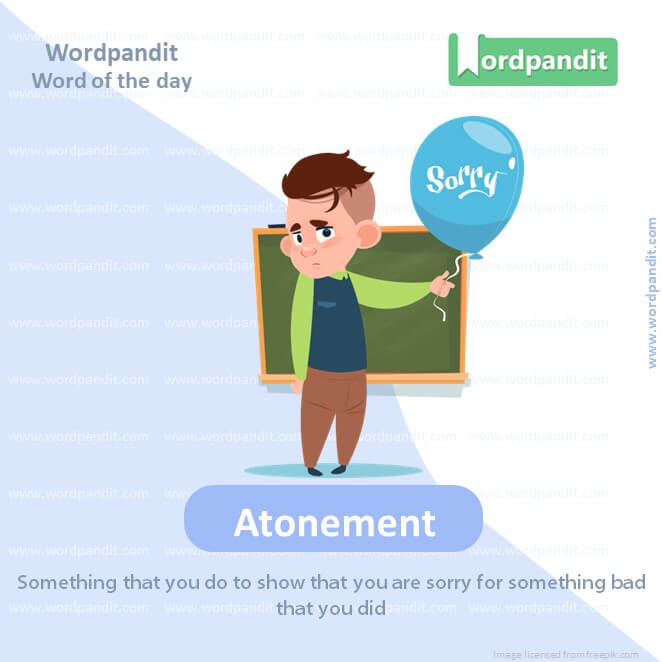
WORD-2: Atonement
CONTEXT: Some progressives try to nod to this fact with land-acknowledgment statements, which are now common on college campuses, but that’s a remarkably cheap and performative form of atonement.
SOURCE: The New York Times
EXPLANATORY PARAGRAPH: Imagine you accidentally broke your friend’s toy and felt really sorry about it. So, you decide to fix the toy or buy them a new one to show you’re sorry and make things right. Atonement is when you try to fix a mistake or do something good to show you are sorry for something bad you did.
MEANING: Something that you do to show that you are sorry for something bad that you did.
PRONUNCIATION: uh-TONE-ment
SYNONYMS: Reparation, Redemption, Amends, Penitence, Expiation, Reconciliation
USAGE EXAMPLES:
1. He donated to charity as a form of atonement for his past mistakes.
2. The community service was seen as atonement for the damage caused.
3. She sought atonement through sincere apologies and actions.
4. Atonement in many cultures involves specific rituals or ceremonies.
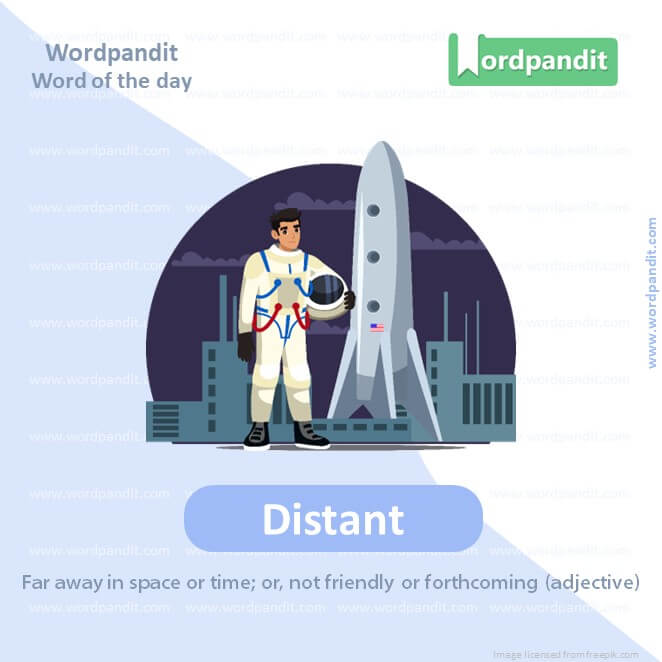
WORD-3: Distant
CONTEXT: At this point, some opponents of settler colonialism might reply that historically distant examples of settler colonialism don’t justify current instances of it.
SOURCE: The New York Times
EXPLANATORY PARAGRAPH: Think about looking at a mountain far away from where you are; it looks so small because it’s distant, or very far away. Also, if a friend doesn’t want to play with you and seems like they’re in their own world, you might feel they’re being distant, not just far away in space, but like they’re not sharing their thoughts or feelings with you.
MEANING: Far away in space or time; or, not friendly or forthcoming (adjective).
PRONUNCIATION: DIS-tuhnt
SYNONYMS: Remote, Far-off, Aloof, Cold, Indifferent, Unapproachable
USAGE EXAMPLES:
1. The distant mountains were barely visible through the haze.
2. He’s been acting distant ever since the argument.
3. The event seems distant now, but it’s only been a year.
4. The concept of space travel was once a distant dream.
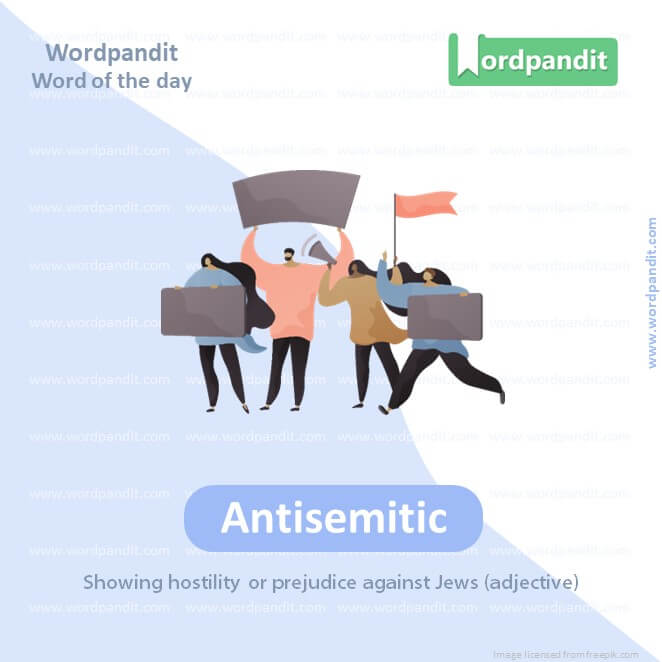
WORD-4: Antisemitic
CONTEXT: To say that Israel alone must be eliminated on grounds of settler colonialism while giving a pass to other cases of settler colonialism is a double standard that is hard to describe as anything but antisemitic.
SOURCE: The New York Times
EXPLANATORY PARAGRAPH: Imagine someone being mean and unfair to another person just because of the religion they follow, specifically Judaism. This is not nice and is called being antisemitic. It’s important to treat everyone kindly and fairly, no matter what their beliefs are.
MEANING: Showing hostility or prejudice against Jews (adjective).
PRONUNCIATION: an-tee-SEM-i-tik
SYNONYMS: Racist, Prejudiced, Bigoted, Discriminatory, Intolerant, Xenophobic
USAGE EXAMPLES:
1. The graffiti was condemned as an act of antisemitic vandalism.
2. Historical events have shown the devastating impact of antisemitic policies.
3. They organized a campaign to fight against antisemitic attitudes in the community.
4. The book examines the rise of antisemitic movements in the 20th century.
WORD-5: Heritage
CONTEXT: As it is, most Israelis were born to Israeli parents and grandparents, and many can trace their heritage in the land many more generations back.
SOURCE: The New York Times
EXPLANATORY PARAGRAPH: Think about the stories, traditions, or special things your family has passed down from your grandparents, like recipes, songs, or celebrations. These are all part of your heritage. It’s like a treasure of your family’s history and culture that’s shared with you and that you can share in the future.
MEANING: The traditions, achievements, beliefs, etc., that are part of the history of a group or nation (noun).
PRONUNCIATION: HER-i-tij
SYNONYMS: Legacy, Inheritance, Tradition, Culture, Ancestry, Birthright
USAGE EXAMPLES:
1. The festival celebrates the rich heritage of the local community.
2. She’s very proud of her Italian heritage.
3. The museum houses artifacts of historical and cultural heritage.
4. Preserving our natural heritage is important for future generations.
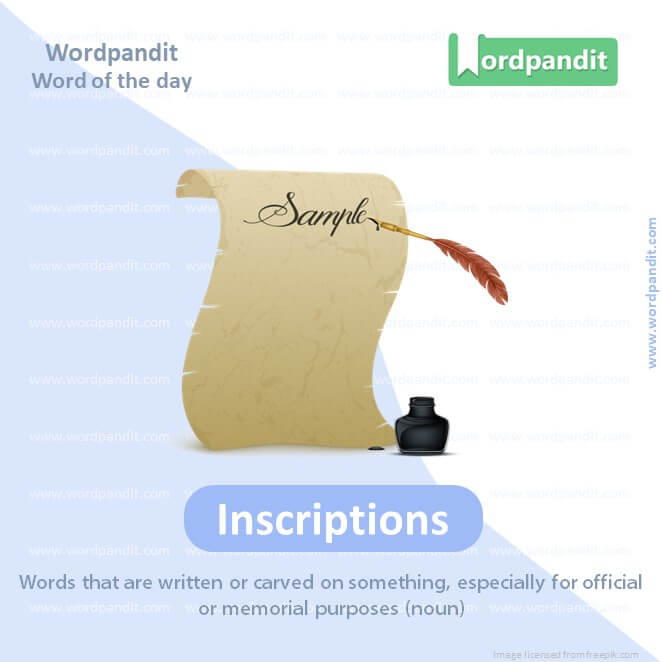
WORD-6: Inscriptions
CONTEXT: And virtually every Israeli can read Hebrew inscriptions on Jewish coins found in archaeological sites throughout Israel dating back more than 2,000 years.
SOURCE: The New York Times
EXPLANATORY PARAGRAPH: Imagine finding a rock or a piece of jewelry with words or names carved into it. These carved words are called inscriptions. They can tell us who owned something, who made it, or even a special message from a long time ago, like a secret note that everyone can see.
MEANING: Words that are written or carved on something, especially for official or memorial purposes (noun).
PRONUNCIATION: in-SKRIP-shuhns
SYNONYMS: Engravings, Carvings, Writings, Etchings, Epitaphs, Legends
USAGE EXAMPLES:
1. The ancient vase had inscriptions that told of its maker.
2. They added a loving inscription on the inside of the wedding ring.
3. The monument bore inscriptions honoring fallen heroes.
4. Researchers deciphered the inscriptions found in the old ruins.

WORD-7: Exiled
CONTEXT: It’s odd, to say the least, that the ethnic group that is today most vociferously accused of settler colonialism is the one that can unmistakably trace its language, culture and religion to the same places from which it was long exiled and now inhabits and governs. Whatever else it is, Jewish nationalism — that is, Zionism — is the oldest continuous anticolonial movement in history, starting well before the Romans sought to de-Judaize the area by calling their Levantine colony Palestina.
SOURCE: The New York Times
EXPLANATORY PARAGRAPH: Imagine if someone was made to leave their home and not allowed to come back, maybe because they broke the rules or were not getting along with others. This is what being exiled means. It’s like being sent on a very long time-out far away from home.
MEANING: Forced to leave one’s country or home, often by official decree (verb).
PRONUNCIATION: EX-iled
SYNONYMS: Banished, Expelled, Ostracized, Deported, Displaced, Outcast
USAGE EXAMPLES:
1. The leader was exiled to a remote island after the coup.
2. Many artists were exiled for their political beliefs.
3. He lived as an exiled writer in Europe for many years.
4. The exiled queen dreamed of returning to her homeland.
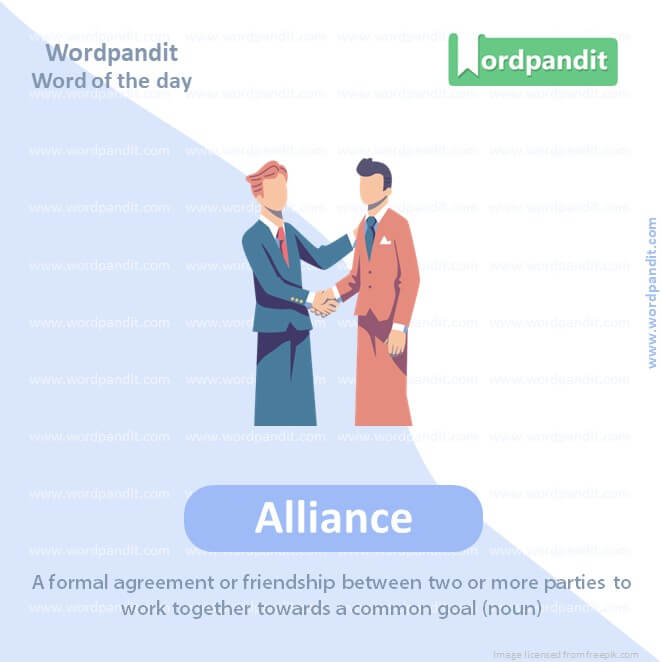
WORD-8: Alliance
CONTEXT: “There’s no alliance more historic, nor more important, than the alliance between Black Americans and Jewish Americans.”
SOURCE: The New York Times
EXPLANATORY PARAGRAPH: Imagine you and your friends forming a team to build the biggest sandcastle. You agree to work together and help each other out. This team you’ve made is like an alliance. It’s when people, groups, or even countries decide to work together for a common goal or to help each other.
MEANING: A formal agreement or friendship between two or more parties to
work together towards a common goal (noun).
PRONUNCIATION: uh-LY-uhns
SYNONYMS: Coalition, Partnership, League, Federation, Union, Pact
USAGE EXAMPLES:
1. The two companies formed an alliance to market the product.
2. The countries entered into a military alliance for their mutual defense.
3. The environmental groups formed an alliance to promote conservation.
4. The alliance between the political parties led to a new government.
WORD-9: Longstanding
CONTEXT: The relationship between these two communities is longstanding and hit its stride during the civil rights movement. But it hasn’t been without periods of friction.
SOURCE: The New York Times
EXPLANATORY PARAGRAPH: Think about a friendship that has lasted for a very, very long time, like the one you might have with your oldest friend. This friendship didn’t just start; it’s been growing for years and years. That’s what longstanding means—something that has been around or continued for a long time.
MEANING: Existing or continuing for a long time (adjective).
PRONUNCIATION: LONG-stan-ding
SYNONYMS: Long-term, Enduring, Established, Perennial, Persistent, Chronic
USAGE EXAMPLES:
1. The longstanding tradition of the festival brings the community together.
2. They resolved their longstanding dispute with a formal agreement.
3. The building is part of the town’s longstanding heritage.
4. His longstanding commitment to charity work is admirable.
WORD-10: Stride
CONTEXT: The relationship between these two communities is longstanding and hit its stride during the civil rights movement. But it hasn’t been without periods of friction.
SOURCE: The New York Times
EXPLANATORY PARAGRAPH: Imagine walking with really big steps, reaching far with your legs each time you move forward. This big step is called a stride. It’s what you do when you’re in a hurry or feeling confident, walking like you’ve got somewhere important to go. Stride can also mean making progress or improvement in something.
MEANING: A long step in walking; progress in development or action (noun).
PRONUNCIATION: stryd
SYNONYMS: Step, Pace, Progress, Advance, Leap, March
USAGE EXAMPLES:
1. He crossed the room in just a few long strides.
2. The team has made significant strides in their project.
3. She took the stairs two at a stride.
4. Making strides in technology has greatly improved our daily lives.
vocabulary games for adults
Learning new words and expanding one’s lexical range should not be confined to the four walls of a classroom nor should it be deemed an activity exclusively meant for children. Yes, we’re talking about ‘vocabulary games for adults,’ a fun and interactive way to intensify language skills and broaden intellectual horizons.
Often, people associate the term ‘vocabulary games for adults’ with something overwhelming or tedious. However, its essence is quite the opposite: to transform the otherwise mundane process of vocabulary augmentation into an engaging, enjoyable experience. Such games enable adults to step out of their comfort zone, explore the vast world of words, and become more articulate and proficient in communication.
Vocabulary games for adults are ideally designed to challenge the mind and stimulate curiosity. Rather than the constant flipping of flashcards or poring through dictionaries, these games incorporate a playful element, ensuring the learning experience is not just effective but also entertaining. They help in retaining new words better and applying them more fluidly in everyday conversation.
Ranging from online crossword puzzles, word searches to mobile applications, there are umpteen vocabulary games for adults available at the tips of your fingers, seamlessly merging learning with leisure. Not forgetting the traditional Scrabble or Boggle which not only test players’ vocabulary but also their strategic abilities.
But how should vocabulary games for adults be learned and incorporated into daily life? The key here is not to complicate it. Committing to fifteen or twenty minutes of gameplay a day, perhaps during your commute or break time, can lead to significant improvement over time. Remember, it’s not about winning; it’s about progressively expanding your diction.
In conclusion, vocabulary games for adults are not only an excellent tool for wordsmiths but also for those seeking to reinforce their linguistic competence or simply with the desire to learn. So why wait? Add a fun twist to your daily routine with vocabulary games for adults and become a wordsmith yourself!











